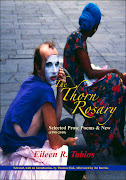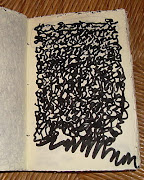I am a body in relation to other bodies
--Leny M. Strobel, from Introduction to BABAYLAN: Filipinos and the Call of the Indigenous
The fabulously cerebral poet-scholar-critic Joi Barrios emailed recently. She complained! Okay, not really. But she said that she and others apparently wished that I had read more of my own poems during my presentation at the Literature Panel for the Babaylan Conference. I did read an excerpt from one poem but otherwise blathered prose and tore up a poetry book (more on that latter bit of theater later). But Joi said, when it comes to poetry, the poet's voice matters, you know.
Yes, I know. [Insert sigh.] But I actually haven't been eager to do poetry readings for many years now. There are many reasons...and it's all complicated. Not the most important reason because I do love my ego ("I love my ego"--get it?), but one reason I haven't done much is the whole process just seemed so ... narcissistic. Perhaps I've witnessed too many poets desperate to be heard (it's not that I don't understand the debilitating effect of not being heard, in poetry or otherwise; but I just don't ... want to be like that ...?). Perhaps I just haven't gotten the right type of feedback, like Joi letting me know of her response to my panel presentation. Anyway, simplistically, it's seemed pointless to me because the usual poetry reading is about the poet presenting his/her/hir poems and it all just seems so "me-me-me."
I once read an article about a poet who, in doing poetry readings, always begins or includes one poem by someone else. That, I thought, was fabulous. Kapwa et al. But think about it for the millions (yeah, right) of you who attend poetry readings. How often do you see poets share poems by others?
But, it is true--as Joi sez--that a poet's reading can embody a poem/poetic engagement. So I now shall give you all the ability to view and touch my body in person at an upcoming reading for the lively Small Press Traffic (SPT) in San Francisco. This reading may be of particular interest to this blog's readers as I plan to raise my new-found exploration of indigenous values--since my reading, after all, is part of the SPT series themes of "empire" and "communities". I hope to see you there next Friday -- we might even share ... gas (heh).
SMALL PRESS TRAFFIC
May 7, 2010
Eileen Tabios and Susan Gevirtz
Small Press Traffic
Literary Arts Center at CCA
1111 -- 8th Street
San Francisco, California 94107
smallpresstraffic at gmail
415-551-9278
Susan Gevirtz's recent books include Aerodrome Orion & Starry Messenger (Kelsey Street Press), broadcast, and Without Event: Introductory Notes (forthcoming from eohippus labs). Along with teaching locally at various Bay Area institutions, with Greek poet Siarita Kouka she runs The Paros Symposium, on Paros island, an annual meeting of poets and translators from Greece and the United States.
Eileen R. Tabios' publications include 18 poetry collections, two novels, an art essay collection, a poetry essay/interview anthology, and a short story book. She most recently released THE THORN ROSARY: SELECTED PROSE POEMS & NEW (1998-2010), selected with an introduction by Thomas Fink and an afterword by Joi Barrios. She wishes more people attending her poetry readings would bring her food.
Okay--I inserted in that last sentence in my bio at the last minute. After all, I want to swallow ... You!*
__________
*Moments like this are what make me wonder over why people take me seriously...



3 comments:
I kind of have to disagree with Joi.
I remember hearing a recording of Robert Frost read his own poems and thought, maybe I don't really need a poet to read their own work. I think people like hearing poets read their poems as if they're getting an insight to their motives and emphasis of words.
But having read my own poems, I know this is not true, because I read my poems not as the poet but as the performer. I'm not really giving the audience any "insight", I'm just doing an interpretation of myself. Hell, sometimes I forget what I wrote and after a reading, I think, wow, this writer is pretty good! But I'm so disconnected to the "writer" who wrote that poem. As a performer I'm "selling" the poem, the emotion.
I think it speaks more about writers when I find out what they read, what they do, where they go, because it's that experience that really makes a difference. Their process, not the product. I've read the poem, I know if the product is good (or if I like it), so what I want to know is the process. But perhaps that's just me as a writer.
I almost liken it to Joss Whedon critiquing the idea of DVD movie commentaries:
http://www.youtube.com/watch?v=vM3Hme36g0s
[This is Part 1 of a response as, apparently, my reply is too long for the Comment Box.]
Hola Gura,
I agree with both you and Joi! Because I am Missy Kapwa!
Okay, actually, I empathize with your assessment. I think that for 98% of the poetry readings I've attended, I as a listener have not received any of what you call extra "insight" (directly about the poems) by hearing them read by their authors. And if one focuses on poets doing readings because they're pitching a new book, that percentage probably goes up to 99.5%.
But there is that 1%, mas o menos, where the poets' voice, I feel, actually does embody the poems. It's a distinct minority -- as I write this, I can think of only three-four poets who've achieved that synchronicity in terms of what I've witnessed (if there's more than four, it probably isn't more than one more extra). I won't mention the names of this handful of poets so as not to piss off my nine million poet best friends--this way, everyone I know can believe I'm praising them as one of the four whose individual voice matters to the poem's reading. I'm not talking about performance--some poets read or perform better than others. I really am talking about the poem being presented fleshed out because of the way it was read by its maker.
When that 1% group does a reading, it is absolutely special and incredible. I don't really know how to describe it, so I'll revert back to this blog's favorite example, Moi--
I've written a lot of prose poems, which means I've also done a lot of long long lines in poems. And back in the late 1990s when I was doing poetry readings, I always felt quite in tune with these poems because I had the ability back then to hold my breath for a long time. This meant that I can recite a poem for a long time without having to take a pause to breathe. Structurally, it was relevant back then that the length of my lines mirrored the extent of my long breath...
[To be Continued]
[And continuing...]
But now, as it's turned out, aging has meant a shortening in my breath--and when I read those older prose poems, I actually feel the need to interrupt the speaking-flow with an inhale or two. I might think that if my current body was to read them today, my reading wouldn't be giving any extra "insight" to those poems that one couldn't glean by reading them on the page.
Presumably, the poem (on the page) is still as good now as it was years ago when they were written in sync with my younger body. But I don't read those poems as often nowadays because I feel my body/breathe isn't supporting those poems. (Interestingly, the poem I read during the Babaylan conference that Joi heard wasn't a prose poem but a hay(na)ku sequence, which is to say a bunch of short lines...). It actually will be interesting to read from THE THORN ROSARY because it's a new book but, as a "selected poems" project, includes those older prose poems...
I suspect, too, that there's a correlation between whether the poem was birthed through a body-based poetics. I'm not talking necessarily about an intellectual (whether it's feminist, political, persona-imagined,etc.) interest in the body. I'm talking about a literal link to the body -- for example, I've got the most horrific bad back because of how tension calcifies my flesh -- anyone who knows my work would know it contains a lot of ... tension. In the prose poems, there often was a physical link between my body and my words...I'm not saying this is a better approach than others when it comes to poem-making, but perhaps it affects the relevance or effectiveness of a poetry reading.
In other poems with different conceptual underpinnings, I most definitely agree that my reading of them in person would not necessarily add insight about them.
So what's a poet, who's self-aware enough to know her physical recitation isn't adding incremental insight going to do? How do they elevate the poetry reading to be better than a poor approximation of what's available on page? Performance then matters. Revealing process most definitely is a great way -- that interests me, too. I also find that I'm contextualizing poems when I do a poetry reading, and often experimenting with how they fit a context that I wasn't consciously considering when I was writing the poems. (It's certainly a better way to present poems than the inept, "I've got two more poems..." or the banal unexplained "these poems are from a manuscript-in-progress" or the obvious "this poem is about a cat" and then the poet proceeds to meow...you get my drift).
Anyway, all I can share is that when one experiences the very rare voice- or even body-embodiment of a poem, it is absolutely unforgettable in the most positive way. I wish this experience for everyone, but also recognize that it's rare, if only because there's such a variety of poetics nowadays and most seem not to be concerned with the body...
And now I shall try to see that youtube thingie, if my mountain internet allows this body to be so moved that way...
cheers,
Eileen
Post a Comment